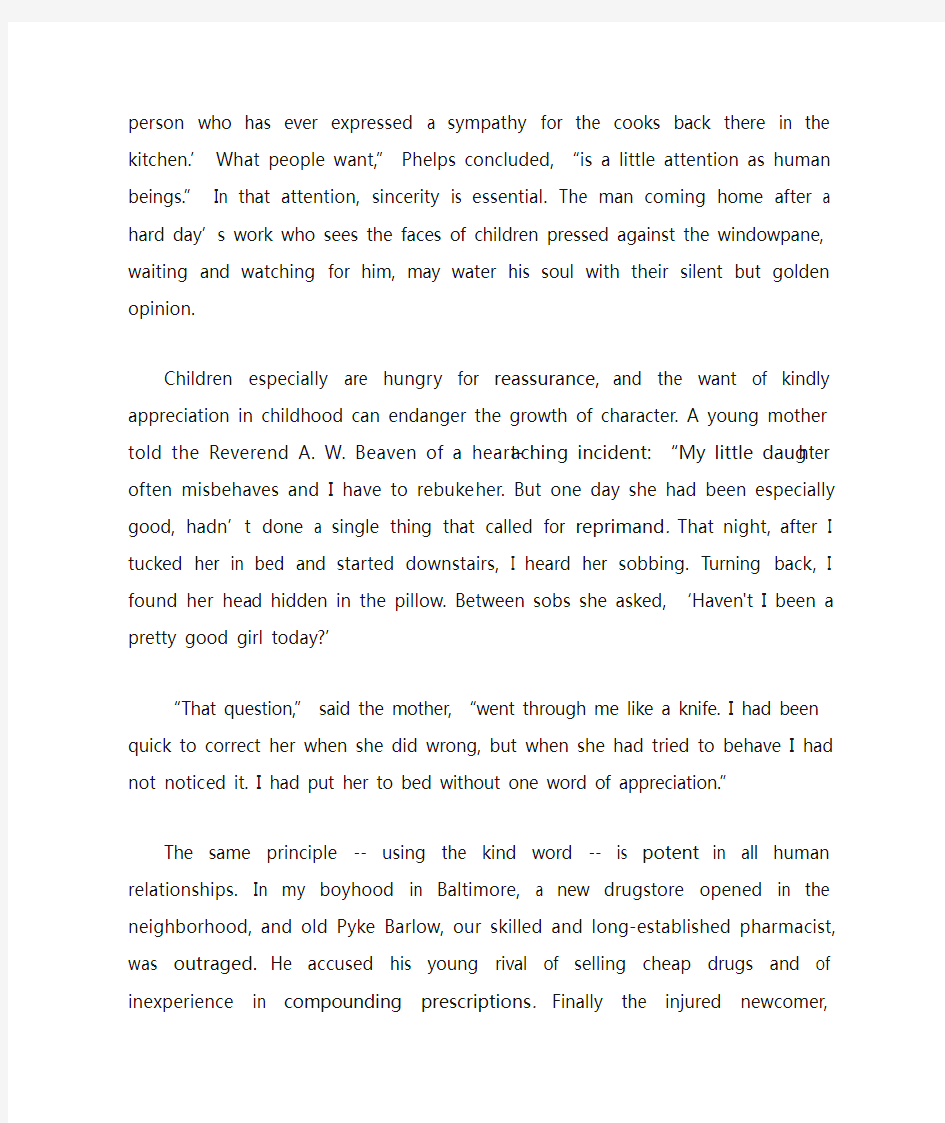There Is Magic in a Word of Praise


There Is Magic in a Word of Praise
Fulton Oursler
A Broadway comedian once had a nightmare:he dreamed he was telling stories and singing songs in a crowded theater, with thousands of people watching him -- but no one laughed or clapped. “Even at $ 100,000 a week,” he says, “that would be just hell on earth.”
It is not only the actor who needs applause. Without praise and encouragement anyone can lose self-confidence. Thus we all have a double necessity: to be commended and to know how to commend. There is a technique in giving a compliment, a right way to go about it. It is no real compliment, for instance, to praise a man for some obvious attainment. Use discernment and originality. “That was a wonderfully convinc ing speech you made tonight,”a gracious woman once said to a businessman. “I could not help thinking what a fine lawyer you would have made.”The merchant flushed like a schoolboy at the unexpected character of the tribute.
No one, great or obscure, is untouche d by genuine appreciation. Yale?s re-nowned English professor, William Lyon Phelps, related: “One hot summer day I went into a crowded restaurant for lunch. When the waiter handed me the menu, I said, …The boys in the kitchen cert ainly must be suffering today!? The waiter looked at me in surprise. …People come in here and complain about the food, kick about the service and growl about the heat. In nineteen years you are the first person who has ever expressed a sympathy for the co oks back there in the kitchen.? What people want,” Phelps concluded, “is a li ttle attention as human beings.”In that attention, sincerity is essential. The m an coming home after a hard day?s work who sees the faces of children pressed against the windowpane, waiting and watching for him, may water his soul with their silent but golden opinion.
Children especially are hungry for reassurance,and the want of kindly apprecia-tion in childhood can endanger the growth of character. A young mother told the Reverend A. W. Beaven of a heart-aching i ncident: “My little daughter often misbehaves and I have to rebuke her. But one day she had been especially good, hadn?t done a single thing that called for reprimand. That night, after I tucked her in bed and started downstairs, I heard her sobbing. Turning back, I found her head hidden in the pillow. Between sobs she asked, …Haven't I been a pretty good girl today??
“That question,” said the mother, “went through me like a knife. I had been quick to correct her when she did wrong, but when she had tried to behave I had not noticed it. I had put her to bed wit hout one word of appreciation.”
The same principle -- using the kind word -- is potent in all human relationships. In my boyhood in Baltimore, a new drugstore opened in the neighborhood, and old Pyke Barlow, our skilled and long-established pharmacist,was outraged.He accused his young rival of selling cheap drugs and of inexperience in compounding prescriptions. Finally the injured newcomer, contemplating a suit for slander, went to
see a wise lawyer, Thomas Hays. “Don't make an issue of it,” Hays advised. “Try kindness.”
Next day, wh en customers reported his rival?s attacks, the new druggist said ther e must be a mistake somewhere. “Pyke Barlow,” he told them, “is one of the finest pharma cists in this town. He?ll mix emergency prescriptions any hour, day or night, and the care he takes with them sets an example for all of us. This neighborhood has grown –there?s p lenty of room for both of us. I?m taking his store as the pattern for mine.”
When the older man heard these remarks -- because compliments fly on the winds of gossip quite as fast as scandal-he could not wait to meet the young fellow face to face and give him some helpful advice. The feud had been wiped out by sincere and truthful praise.
Why do most of us leave unuttered some pleasant truths that would make others happy? “A rose to the living is more than sumptuous wreaths to the dead.”A charm-ing old gentleman used to drop in at an antique shop near Conway, New Hampshire, to sell merchandise. One day after he left, the antique dealer?s wife said she wished they had told him how much they enjoyed his visits. The husband replied, “Next time let?s tell him.”
The following summer a young woman came in and introduced herself as the daughter of the salesman. Her father, she said, had died. “Since that day,” says the shop-owner, “whenever I think something nice about a person, I tell him. I might never have another chance.”
As artists find joy in giving beauty to others, so anyone who masters the art of praising will find it blesses the giver as much as the receiver. It brings warmth and pleasure into commonplaces and turns the noisy rattle of the world into beautiful music.
Something good can be said about everyone. We have only to say it.
